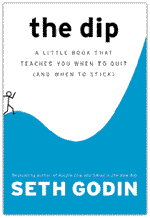Q&A: The Dip and knowing when to quit
Our series continues with the book that led to the most questions so far: The Dip.
I veered even further off the marketing path with this book, my shortest and one of my most popular books–a book that intentionally asks more questions than it answers.
This is a book about mediocrity—about having the impatience to get rid of it and the patience to avoid the problem in the first place.
Two simple, unrelated examples: You're probably mediocre at Twitter (if we define mediocre as average, then, do the math, most people are). Some people, though, set out from the first day intent on doing it often enough, generously enough and creatively enough that they would break through and become one of the handful that gets followed merely because others are following them. At some point along the way, this effort became a big enough slog that instead of leaning in, most people on the journey backed off and settled on being part of the herd of millions.
Or consider the case of the actor, the one seeking to be picked by the casting director and "made" famous. Just about every single person who enters this field fails, because the dip is so cruel and the arithmetic of being chosen is so brutal. People who are aware of the Dip, then, don't even try. They pick a different field, an endeavor where they have more control and more influence, a field where others have shown that effort can in fact lead to success.
[I don't use Twitter mostly because I saw the effort that would be required to do it 'right' and the toll it would take on me and my work. And I'm not an actor because I have no talent and because I couldn't imagine the grind of endless auditions.]
Asking the question, the one I get asked the most, "how do I know if it's a dip or a dead end?" is the wrong question, just as asking, "how do I know if it's remarkable?" isn't the key to the Purple Cow. No, the key insight is to ask the question, not to know the answer in advance. Asking yourself, "is this something that will respond to guts, effort and investment?" helps you decide whether or not this is where you can commit. And then, if you do commit, you're not browsing, you're in it.
The resistance is real indeed, and it fears being best in the world, it fears being on top, it fears being seen as the winner. So the resistance is just fine with pushing you to wander, to quit the wrong things at the wrong time, and most of all, to seek out the sinecure of mediocrity. The resistance will cajole and wheedle you until you compromise and get stuck with what you believe you deserve, instead of what you are capable of. The resistance wants a map, when you really need a compass.
Someone is going to come out the other side, someone is going to be brave enough and focused enough to be the best available option. Might as well be you.
This might not work, sure, but who better than you to try?
[Here's a two-minute excerpt from the audio, and here's the original blog about the book.]

